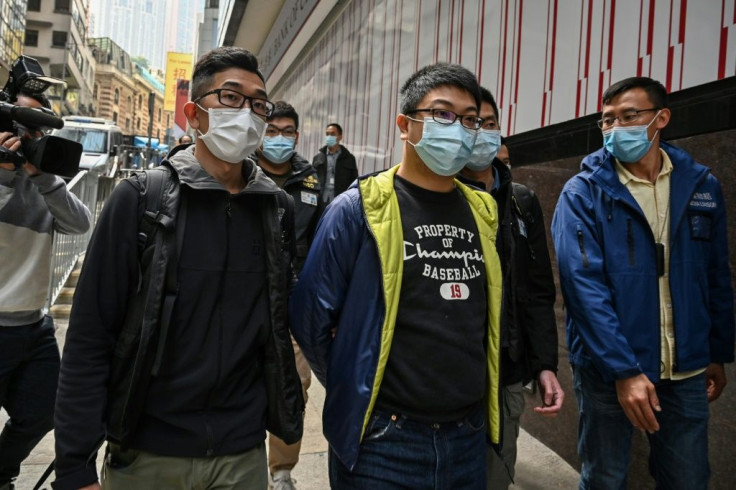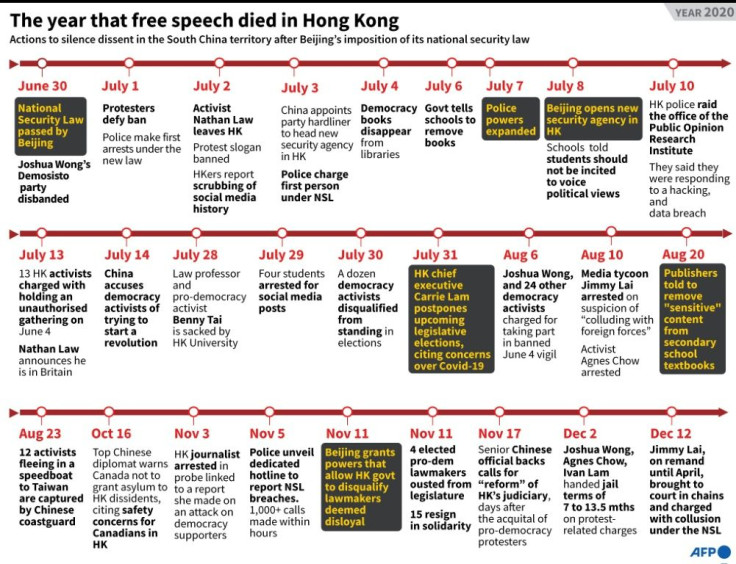Condemnation Swells Over Hong Kong Opposition Mass Arrests
Hong Kong authorities awoke to a chorus of international condemnation on Thursday following the mass arrest of pro-democracy opposition figures under a draconian national security law that Beijing imposed on the finance hub.
Western nations accused Hong Kong authorities of "grave repression" and a "grievous attack" on the freedoms that were promised under the "One Country, Two Systems" setup when the British colony was returned to China.
More than 1,000 police officers detained 53 prominent figures -- including a US citizen -- in dawn raids Wednesday on charges of "subversion", a new national security crime that carries up to life in prison.
British foreign minister Dominic Raab called the detentions "a grievous attack on Hong Kong's rights and freedoms" and said Beijing "deliberately misled the world about the true purpose" of the security law.
It is "being used to crush dissent and opposing political views", he added.
His Canadian counterpart Francois-Philippe Champagne called for those arrested to be released and described the operation as a "grave repression of political pluralism" that demonstrated a "further erosion" of "One Country, Two Systems".

France issued a similar statement decrying the "continuing deterioration" of freedoms in Hong Kong.
The European Union also called for the release of those arrested, while Antony Blinken, US President-elect Joe Biden's nominee for Secretary of State, said the incoming administration "will stand with the people of Hong Kong and against Beijing's crackdown on democracy".
Wednesday's sweep was the latest salvo in Beijing's battle to stamp out dissent in the semi-autonomous city after millions hit the streets in 2019 with huge and sometimes violent democracy protests.
"Very clearly and unequivocally it demonstrates the Chinese government's control over Hong Kong," Dylan Loh, an expert on China's politics at Singapore's Nanyang Technological University, told AFP.

"There should be no illusions anymore that the central government is firmly in control," he added.
The alleged offence of those arrested on Wednesday was to organise an unofficial primary last summer to decide who would stand as candidates for the city's partially-elected legislature in the hopes they might take a majority for the first time.
Many of those candidates were ultimately disqualified from standing and authorities scrapped the election because of the coronavirus.
But Chinese and Hong Kong officials described the primary as an attempt to "overthrow" and "paralyse" the city's government and therefore a threat to national security.
Those detained on Wednesday represented a broad cross-section of Hong Kong's opposition, from veteran former pro-democracy lawmakers such as James To, Andrew Wan, Lam Cheuk-ting and Claudia Mo to a host of younger activists.
John Clancey, an American national and long term Hong Kong resident who worked at a prominent human rights law firm was also arrested for subversion.
Hong Kong police can hold anyone arrested for up to 48 hours before they must be presented in court.
A senior police source told AFP on Thursday that most of those arrested were expected to initially be released on bail later in the day, rather than charged.
Those charged with national security crimes are not usually granted bail.
The national security law was imposed on Hong Kong in late June in response to the 2019 protests, targeting acts Beijing deems to be secession, subversion, terrorism and collusion with foreign forces.
Officials said the security law would target only an "extreme minority".
But it swiftly silenced dissent and outlawed a host of peaceful political views, with dozens of prominent figures targeted even before Wednesday's operation.
Over the course of the last year, prominent democracy supporters have been arrested, jailed, barred from politics or have fled overseas.
© Copyright AFP 2024. All rights reserved.




















